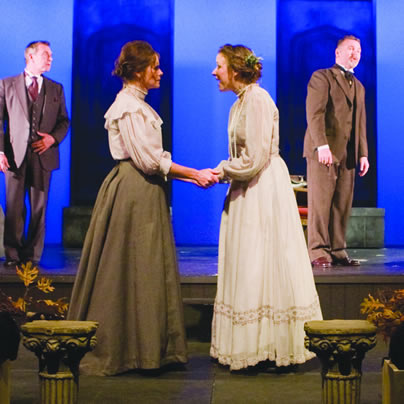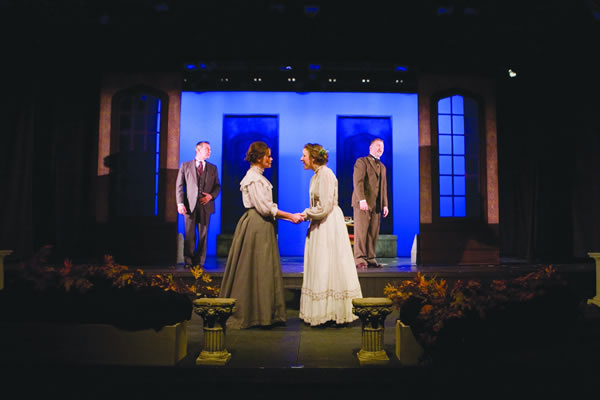Arts & Entertainment
Broadway at the beach
Clear Space provides theater fix for Rehoboth visitors all summer

Rehoboth Clear Space Theatre
20 Baltimore Ave.
Rehoboth Beach, Del.
Show times depend on the week

A scene from one of last year’s plays at Rehoboth Clear Space Theatre. (Photos courtesy the theater)
General admission is $30, senior citizens are $25 and students are $15
For many theaters, summer is the slowest time of year as families escape the city heat for the cooler shore. But for Clear Space Theatre in Rehoboth Beach, the influx of tourists keeps the theater teeming with people finding alternative ways to spend a summer night at the beach.
The theater gets so busy that this year its management is running three different shows at once in rotation. This year’s shows, which each cost between $8,000 and $25,000 to produce, include, “Cabaret,” “Broadway at the Beach” and “Annie.”
“Our seasons tend to appeal to a variety of tastes,” says Doug Yetter, founder and musical director. “For the summer season, we offer a family musical (“Annie”), a more adult-themed show (“Cabaret”) and a revue show that bridges the gap.”
“Annie,” opened June 30 and is the famous musical about a little orphan girl who goes on adventures in her orphanage and eventually around New York City, ingratiating herself with the president and finding a home in the Warbucks’ mansion.
“Cabaret” opened June 28 and is the more mature show being performed at Clear Space. Taking place in the Kit Kat Klub in Nazi Germany, American writer Cliff falls for a Klub performer named Sally Bowles. The play observes how they try to make their love survive in a changing world.
“Broadway at the Beach” opened this week and brings several Broadway hit songs to the shores of Delaware.
All shows run until September with “Broadway at the Beach” closing the season on Sept. 2.
Despite the schedule — each show is performed at least once a week — changing sets hasn’t been a problem.
“When my former partner and I were thinking to move down here, we thought we need to clear some space,” Yetter says. “We don’t need great sets for this; we let the audience bring their imagination.”
Yetter and his former partner co-founded Clear Space Theatre when they moved to Rehoboth Beach from New York City in 2004. Yetter says they thought the community would “benefit both culturally and economically from having a year-round theater.”
Yetter had about 40 years of musical theater experience, putting on productions all over the country. At Clear Space he works largely as artistic and musical director, overseeing all productions.
Since there’s not a strong emphasis on the sets for these shows, the costumes and characters have to carry the productions. Bill Clark, the full-time costume designer, immerses himself in the various stories to dress the cast appropriately.
“When we choose the shows we’re going to do three months out from our first creative meeting, I read the scripts three times,” he says. “Then I create a costume plot, detailed scenes that serve as a map, and from there I sketch individual costumes.”
For Clark’s favorite costumes in “Cabaret,” he began studying the culture in Berlin from 1925 onward. He also studied the works by Christopher Isherwood, a gay novelist from the 1930s, who wrote the original story upon which “Cabaret” is based, trying to reflect its dark tones in the clothes the Kit Kat Klub girls don.
“I’ve put the girls in some vintage lingerie from that era with a corset pattern,” he says.
Compared to other renditions of “Cabaret,” director Dorothy Neuman says her version may appear darker.
“It’s very topical,” she says. “A force in the government, the Nazis who are coming to power, have certain prejudices in society. They consider that they have the right answer. I feel this is a very parallel situation in America, a very strong conservative right in which they think they know what is morally right and if you don’t agree with them then you are not American.”
Neuman, who identifies as a “woman who happens to be gay,” has been directing theater since 1978, starting in various places in Arlington, Va., and Washington.
Michael Matthias, who is acting in all three productions, says that he’s looking forward to “Cabaret” mostly because of its darker overtones. He also says staging three shows is made easier because they are working with mostly the same company all year round.
“We are considered a professional theater because we have a year-round theater company,” he says. “The theater holds auditions for roles not filled by the company.”
As part of the company, he’s expected to continue his growth as an actor by attending classes. This season, he plays Rooster Hannigan in “Annie,” he’s part of the ensemble in “Broadway at the Beach” and also Cliff in “Cabaret.”
Chris Poeschl, an actor brought in for the summer, says Clear Space Theatre is different from most venues where he’s performed.
“It’s such an intimate experience, when we are out on the stage we are in the audience,” he says.
Poeschl is in the ensemble for “Broadway at the Beach,” but is excited for all three productions. None of the plays are LGBT-specific, though “Cabaret,” of course, has long been a gay favorite.
“‘Cabaret’ in our theater is handled very maturely, very real,” he says. “It’s a reliable description.”
Because of the large LGBT population in Rehoboth, Yetter says he makes it a point to include shows with gay appeal.
“We really serve the community,” he says. “It’s important that we have pieces that are inclusive.”
Bob Hoffer and Max Dick, who have been attending performances at Clear Space for the past five years, say the small, tight-knit community of the theater draws in many Rehoboth gay residents and visitors.
“There are a lot of gay and lesbian people involved in the theater,” Hoffer says. “Often you will run into a lot of cast members in the restaurants and bars around the theater. Going to the theater gives you a kind of perk in your day.”
Books
Love or fear flying you’ll devour ‘Why Fly’
New book chronicles a lifetime obsession with aircraft

‘Why Fly’
By Caroline Paul
c. 2026, Bloomsbury
$27.99/256 pages
Tray table folded up.
Check. Your seat is in the upright position, the airflow above your head is just the way you like it, and you’re ready to go. The flight crew is making final preparations. The lights are off and the plane is backing up. All you need now is “Why Fly” by Caroline Paul, and buckle up.

When she was very young, Paul was “obsessed” with tales of adventure, devouring accounts written by men of their derring-do. The only female adventure-seeker she knew about then was Amelia Earhart; later, she learned of other adventuresome women, including aviatrix Bessie Coleman, and Paul was transfixed.
Time passed; Paul grew up to create a life of adventure all her own.
Then, the year her marriage started to fracture, she switched her obsession from general exploits to flight.
Specifically, Paul loves experimental aircraft, some of which, like her “trike,” can be made from a kit at home. Others, like Woodstock, her beloved yellow gyrocopter, are major purchases that operate under different FAA rules. All flying has rules, she says, even if it seems like it should be as freewheeling as the birds it mimics.
She loves the pre-flight checklist, which is pure anticipation as well as a series of safety measures; if only a relationship had the same ritual. Paul loves her hangar, as a place of comfort and for flight in all senses of the word. She enjoys thinking about historic tales of flying, going back before the Wright Brothers, and including a man who went aloft on a lawn chair via helium-filled weather balloons.
The mere idea that she can fly any time is like a gift to Paul.
She knows a lot of people are terrified of flying, but it’s near totally safe: generally, there’s a one in almost 14 million chance of perishing in a commercial airline disaster – although, to Paul’s embarrassment and her dismay, it’s possible that both the smallest planes and the grandest loves might crash.
If you’re a fan of flying, you know what to do here. If you fear it, pry your fingernails off the armrests, take a deep breath, and head to the shelves. “Why Fly” might help you change your mind.
It’s not just that author Caroline Paul enjoys being airborne, and she tells you. It’s not that she’s honest in her explanations of being in love and being aloft. It’s the meditative aura you’ll get as you’re reading this book that makes it so appealing, despite the sometimes technical information that may flummox you between the Zen-ness. It’s not overwhelming; it mixes well with the history Paul includes, biographies, the science, heartbreak, and exciting tales of adventure and risk, but it’s there. Readers and romantics who love the outdoors, can’t resist a good mountain, and crave activity won’t mind it, though, not at all.
If you own a plane – or want to – you’ll want this book, too. It’s a great waiting-at-the-airport tale, or a tuck-in-your-suitcase-for-later read. Find “Why Fly” and you’ll see that it’s an upright kind of book.
The Blade may receive commissions from qualifying purchases made via this post.
Theater
Out actor Kevin Cahoon on starring role in ‘Chez Joey’
Arena production adapted from Broadway classic ‘Pal Joey’

‘Chez Joey’
Through March 15
Arena Stage
1101 Sixth St., S.W.
Tickets start at $93
Arenastage.org
As Melvin Snyder in the new musical “Chez Joey,” out actor Kevin Cahoon plays a showbiz society columnist who goes by the name Mrs. Knickerbocker. He functions as a sort of liaison between café society and Chicago’s Black jazz scene circa 1940s. It’s a fun part replete with varied insights, music, and dance.
“Chez Joey” is adapted from the Broadway classic “Pal Joey” by Richard Rodgers and Lorenz Hart. It’s inspired by John O’Hara’s stories based on the exploits of a small-time nightclub singer published in The New Yorker.
A warm and humorous man, Cahoon loves his work. At just six, he began his career as a rodeo clown in Houston. He won the Star Search teen division at 13 singing songs like “Some People” from “Gypsy.” He studied theater at New York University and soon after graduating set to work playing sidekicks and comedic roles.
Over the years, Cahoon has played numerous queer parts in stage productions including “Hedwig and the Angry Inch,” “La Cage aux Folles,” “Rocky Horror” as well as Peanut in “Shucked,” and George the keyboardist in “The Wedding Singer,” “a sort of unicorn of its time,” says Cahoon.
Co-directed by Tony Goldwyn and the great Savion Glover, “Chez Joey” is a terrific and fun show filled with loads of talent. Its relevant new book is by Richard Lagravenese.
On a recent Monday off from work, Cahoon shared some thoughts on past and current happenings.
WASHINGTON BLADE: Is there a through line from Kevin, the six-year-old rodeo clown, to who we see now at Arena Stage?
KEVIN CAHOON: Anytime I want to land a joke in a theater piece it goes back to that rodeo clown. It doesn’t matter if it’s Arena’s intimate Kreeger Theatre or the big rodeo at the huge Houston Astrodome.
I was in the middle stadium and there was an announcer — a scene partner really. And we were doing a back and forth in hopes of getting laughs. At that young age I was trying to understand what it takes to get laughs. It’s all about timing. Every line.
BLADE: Originally, your part in “Chez Joey” Melvin was Melba who sings “Zip,” a clever woman reporter’s song. It was sort of a star feature, where they could just pop in a star in the run of “Pal Joey.”
CAHOON: That’s right. And in former versions it was played by Martha Plimpton and before her Elaine Stritch. For “Chez Joey,” we switched gender and storyline.
We attempted to do “Zip” up until two days before we had an audience at Arena. Unexpectedly they cut “Zip” and replaced it with a fun number called “I Like to Recognize the Tune,” a song more connected to the story.
BLADE: Wow. You must be a quick study.
CAHOON: Well, we’re working with a great band.
BLADE: You’ve played a lot of queer parts. Any thoughts on queer representation?
CAHOON: Oh yes, definitely. And I’ve been very lucky that I’ve had the chance to portray these characters and introduce them to the rest of the world. I feel honored.
After originating Edna, the hyena on Broadway in “The Lion King,” I left that to do “Hedwig and the Angry Inch” as standby for John Cameron Mitchell, doing one show a week for him.
Everyone thought I was crazy to leave the biggest musical of our time with a personal contract and getting paid more money that I’d ever made to get $400 a week at the downtown Jane Street Theatre in a dicey neighborhood.
At the time, I really felt like I was with cool kids. I guess I was. And I never regretted it.
BLADE: When you play new parts, do you create new backstories for the role?
CAHOON: Every single time! For Melvin, I suggested a line about chorus boys on Lakeshore Drive.
BLADE: What’s up next for Kevin Cahoon?
CAHOON: I’m about to do the New York Theatre Workshop Gala; I’ve been doing it for nine years in a row. It’s a huge job. I’ll also be producing the “Cats: The Jellicle Ball” opening on Broadway this spring; it’s a queer-centric uptown vogue ball with gay actor André de Shields reprising his role as “Old Deuteronomy.”
BLADE: There’s a huge amount of talent onstage in “Chez Joey.”
CAHOON: There is. I’m sharing a dressing room with Myles Frost who plays Joey. He won accolades for playing Michael Jackson on Broadway. We’ve become great friends. He’s a miracle to watch on stage. And Awa [Sal Secka], a D.C. local, is great. Every night the audience falls head over heels for her. When this show goes to New York, Awa will, no doubt, be a giant star.
BLADE: Do you think “Chez Joey” might be Broadway bound?
CAHOON: I have a good feeling it is. I’ve done shows out of town that have high hopes and pedigree, but don’t necessarily make it. “Chez Joey” is a small production, it’s funny, and audiences seem to love it.

The Capital Pride Alliance held the annual Pride Reveal event at The Schuyler at The Hamilton Hotel on Thursday, Feb. 26. The theme for this year’s Capital Pride was announced: “Exist. Resist. Have the audacity!”
(Washington Blade photos by Michael Key)











































